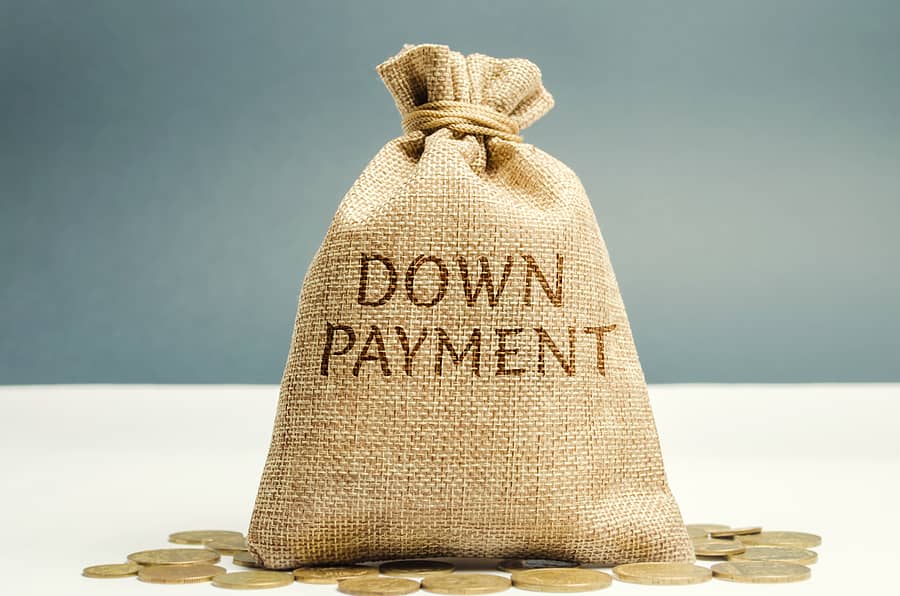Saving for a down payment is often the most challenging aspect of applying for a secured mortgage loan. It is also hard to know exactly how much is the preferred amount to put down. Many Ontario homeowners are reluctant to approach a bank for mortgage financing unless they have a substantial down payment. Many Ontario borrowers face challenges saving for a down payment while managing their other monthly expenses effectively.
To further compound things, it is becoming increasingly more difficult to contemplate buying an Ontario property. Ontario is experiencing historically high home prices and a shortage of inventory, leading to frequent bidding wars on limited properties.
While housing costs in Ontario, particularly in major urban centers like the GTA and central Toronto, may seem daunting, borrowing to supplement your down payment is an option.
Choices for borrowing to help increase money towards a down payment can include:
- Borrow against the equity in another property
- Borrow from family and friends
- Borrow from a retirement fund
- Private short-term loan if credit or salary may be an issue
- Line of credit (only from a financial institution other than where you are applying for a mortgage)
- Credit cards
The Upsides of Borrowing Money to Make a Down Payment on a Home
Like any financial decision big or small, there remains pro and cons to borrowing for a down payment. Whether to borrow to increase down payment funds depends on your comfort level, risk tolerance, and financial situation.
- The funds will enable homeownership sooner- Rather than put money towards rent, borrowing funds to buy a property will enable you to build equity faster than waiting to save the funds.
- Prevents the need for default insurance– If you borrow funds equal to 20% of the cost of the property, you will not be asked to pay Canadian Housing and Mortgage Corporation (CHMC) default insurance. Insurance included in the mortgage payment increases the overall monthly expense despite being rolled into the payment.
- Build wealth by investing in property– By borrowing funds to reach a sizeable down payment you can buy a property that will add to your overall net wealth. Property is appreciating in Canada which makes for a great overall investment.
- The cost of borrowing is at historically low levels- By taking advantage of extremely low interest rates on different loans, you can put this money towards a mortgage, which will lower the overall cost of the mortgage while making payments on the loan you take out to cover the down payment manageable with such low-interest rates attached.
The Downsides of Borrowing Money to Make a Down Payment on a Home
Nothing comes without risk. There can be disadvantages to borrowing for a down payment. Again, the decision comes down to opportunity cost. Does the risk outweigh the gain?
- Using equity as a way to borrow can pose a risk– If you choose to take out a home equity loan or Home Equity Line of Credit (HELOC) through a bank or private lender then you are using some of the equity built in the property you are leveraging your loan against. This equity will take time to rebuild.
- Taking out a loan to cover the down payment will lower your debt service ratio– Lenders will be assessing the amount of debt you have about your income and ability to pay. By taking out additional debt, your overall debt ratio will be impacted slightly.
- You will have to pay back this debt despite low interest rates- Although interest rates remain extremely low currently, taking out another debt, whether it be through a bank, credit union or private lender, still represents a monthly payment that must be met.
- There are costs when taking out a loan- Although the cost may be low currently, you must factor in the total cost of borrowing. If borrowing through private lender interest rates will range between 8% to 12% and fees will range typically between 3% to 6% of the total cost of the loan. Banks will have fees attached as well to consider if borrowing through an A lender.
Alternatives to Borrowing for a Down Payment
- Saving the old-fashioned way– Before credit cards, there were very few alternatives to purchasing anything, big or small. If cash wasn’t on hand, finding a way to save up for it became essential. The same principle can apply to saving for a down payment. By trimming variable expenses, curbing unnecessary spending, and automating deposits into a dedicated fund—can build a robust down payment.
- Government programs are available to help– If you are still finding it difficult to come up with the funds by diligently saving, The First Time HomeBuyers Program launched in 2019 by the Federal Government provides the opportunity for first-time homebuyers to have their savings matched. Government funds, in the form of the built-up equity in the property, are repayable only at the mortgage loan’s term-end. The program is sometimes referred to as a Shared Equity Program. You will be sharing equity with the Government in direct relation to the money that was initially put in.
- Take advantage of RRSP increased contribution room- Recently the amount of money that first-time homebuyers could take out of their RRSP without tax penalty towards a down payment increased from $25,000 to $35,000. For a couple who are both first-time home buyers, the combined amount is $70,000.
- Buy a less expensive property– Consider adjusting your budget. If you are unable to save and borrowing is not a viable option, look at properties that are within budget. Less house equals less expense.
Mortgage Broker Store Can Help Negotiate Loan Options
If you are looking at different loan options to put towards a down payment or other financial short-term solutions, Mortgage Broker Store can help narrow down applicable options. We have access to a network of experienced private lenders across Ontario to match you with the right mortgage provider. Feel free to reach out at your convenience for assistance with purchasing a new property or achieving financial goals. Call 416-499-2122 or email ron@mortgagebrokerstore.com.



